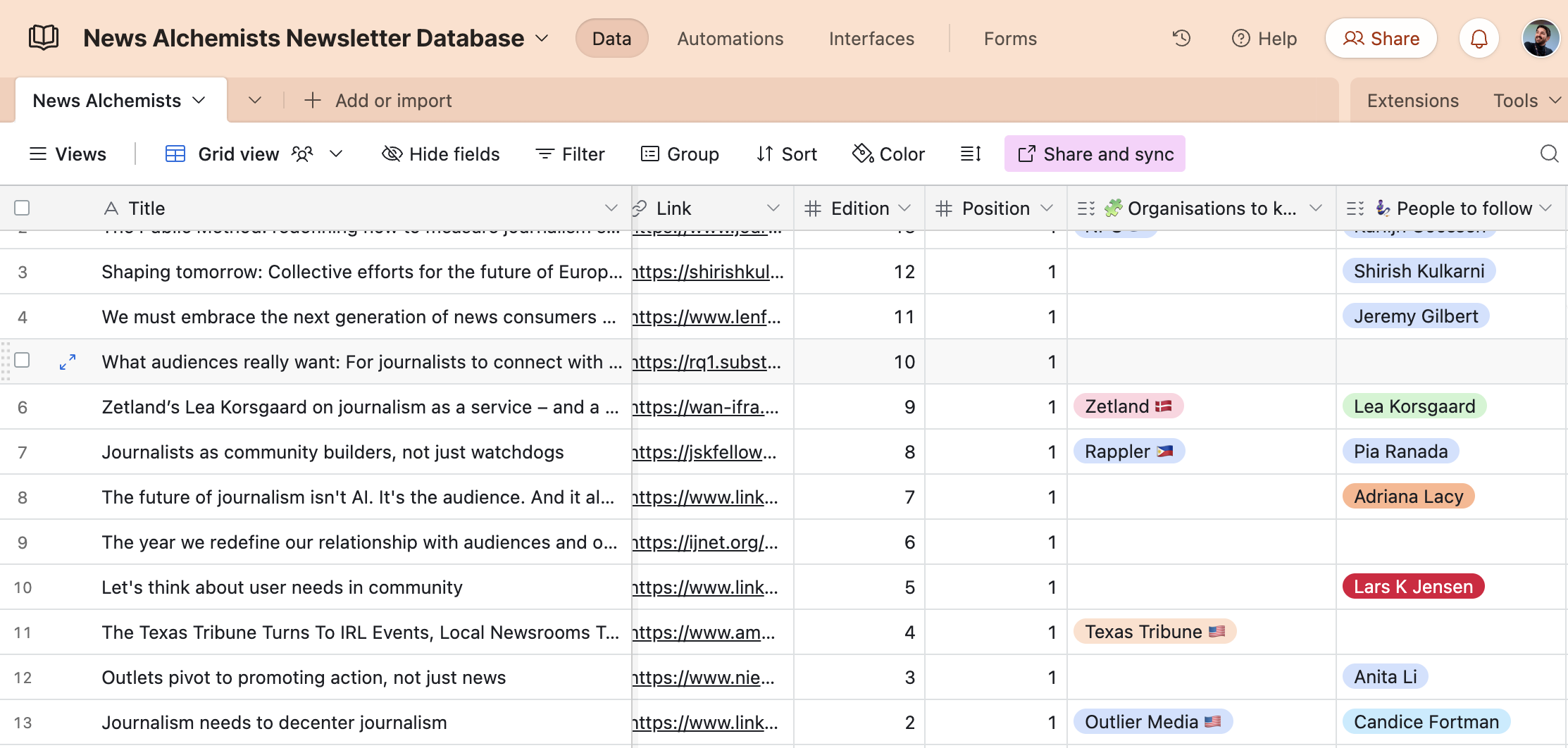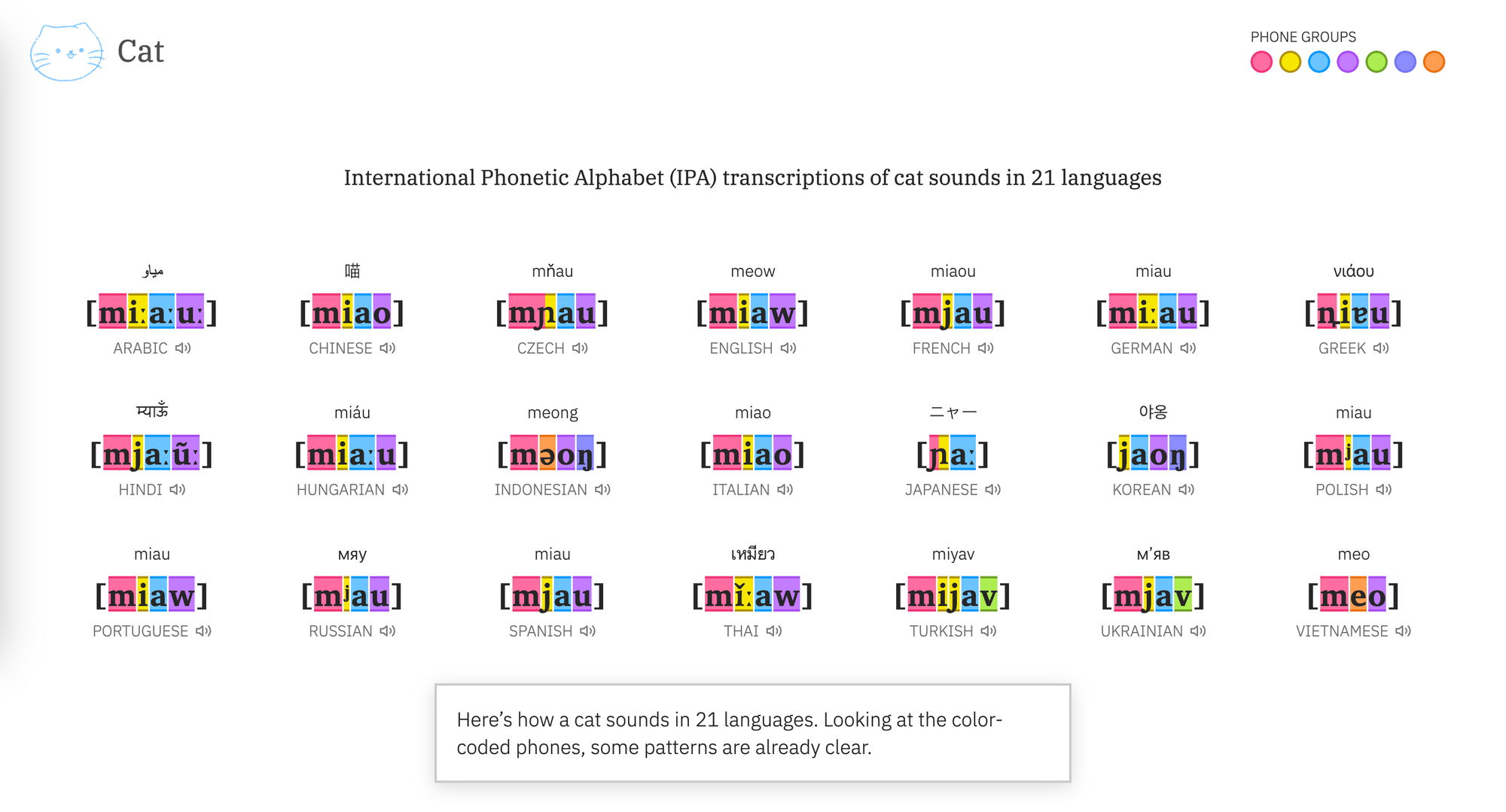News Alchemists #16: "I'm never going to trust your news organization"
Hello and welcome back to the News Alchemists newsletter!
Standard service resumes today after a special edition last week. I'm writing this from a cafe in my Italian hometown, which for some reason feels quite fitting because today this newsletter has not one but two milestones to celebrate.
(A purely imaginary prize goes out to anyone who has ever heard of my hometown and replies to this email telling me how in the world that happened.)
🏆 First milestone: This is the 10th email I'm sending, and it just feels so good to be consistent in doing something on a weekly basis for long enough to reach double digits – all while enjoying doing it as much as I am! A special shout-out if you've been here from the beginning: you're awesome.
🏆 The second milestone benefits from the six editions that I shared on LinkedIn while I was testing the appetite for this newsletter (example). The result: with the seven you're about to read, I've now shared more than 100 links!
And wouldn't it be useful to be able to browse all the links together in the same place? That's what I thought at least, so here they are. A little present for you to celebrate together today's milestones.

To me, this table has already proven useful time and again, because it helps me to keep track of things like: striking the right balance between hopeful and thought-provoking content; between the four ingredients of hope I mentioned in #10; and other important things such as not quoting too often the same people, or not highlighting only organisations from certain parts of the world but not others.
But I created this table first and foremost because I thought it might be useful to you. So the questions are two:
- Is it? As in, do you actually find it useful?
- Or, could it be useful if... [insert here your suggestion]?
Let me know.
Alright, let's go. Here are today's links 📚
1. I'm never going to trust your news organization 👉 LINK
Over the last few weeks, I somehow ended up in a number of conversations about trust in journalism, and I found myself thinking back to this brilliant essay by 🧞Heather Bryant, which is not intended to be as bleak as the headline makes it sound. The argument that Heather makes is that trust was never the right goal – and I tend to agree.
(On the same topic, I also recommend reading 'The obsession with “trust” will end' by 🧞Charlie Beckett.)
2. Which types of people aren’t big fans of “impartial” news? People who don’t have power 👉 LINK
This article has made quite the rounds in my circles recently, so there's a chance you might have seen it already, but I'm willing to take the risk of repetition because it's that important. Trust is not the only concept we need to scrutinise more closely. The idea that journalism must always be impartial deserves an equal amount of scrutiny, and this paper highlights why:
"People belonging to socially disadvantaged groups, such as women, younger, lower-income, and lower-educated participants, may find themselves less attached to journalistic norms that they do not feel have served their interests, which may be a reflection of grievances about journalistic shortcomings with respect to news that purports to be impartial but can come across as biased in favor of more privileged parts of society — especially when it comes to coverage of groups that are often stigmatized or ignored."
3. Here are the winners of the 2025 Inbox Awards 👉 LINK
Inbox Collective by 🧞Dan Oshinsky has been by far one of the most useful resources in setting up my own newsletter. Earlier this year, they created the Inbox Awards to celebrate excellence in newsletter strategy, with categories including 'Innovation in Growth', 'Innovation in Engagement', and 'Innovation in Design'. The winner of the latter is a fantastic magazine I had honestly not heard of until recently (Thanks, Patricia!), which I'm very happy to have an excuse to highlight: 🧩 The Republic is a beautifully-designed Nigerian magazine led by the belief that "writing can connect, empower and humanize communities, and a society of people who consider urgent the need for a Nigeria more critical of itself."
4. Deeper truths: A quick thought on how journalism can become loved (and sustainable) again 👉 LINK
"I think the greatest human need is feeling connected to the people around us, without which we get suspicion and polarisation. And I think there is a very healthy future for journalists and media companies that can provide it." I loved this post written by 🧩 Mill Media's founder 🧞Joshi Herrmann, building on the panel conversation he shared in Perugia with two of my favourite people in the business: 🧞Fran Beighton and 🧞Lea Korsgaard. Sign me up for the 'Media Romantic Movement'!
5. Readers get the chance to ask questions and get involved in the story 👉 LINK
Canadian newspaper 🧩 The Globe and Mail hosts regular Q&As, live events on specific news topics where subscribers get to ask questions to the reporters who are covering the news. Audience growth manager 🧞Rebecca Zamon explains:
"There’s such a wealth of opportunity here, and it works on so many levels. Readers get the chance to ask questions and get involved in the story. Journalists get to talk about parts of the story that didn’t make the article, or go deeper into this topic that they’re so interested in and get story ideas for future coverage."
6. "It's impossible to kill a media brand." What was Quartz? 👉 LINK
Quartz was awesome. It pioneered many new ideas that were then adopted by many others in the industry. Also, it never made money. Earlier this month, it was sold to its fifth owner, and all remaining staff was fired. In this piece, co-founder 🧞Zach Seward (now editorial director of AI initiatives at The New York Times) reflects on what went wrong with remarkable candour.
7. How do animals sound across languages? 👉 LINK
To end this week's newsletter, a sweet little nugget that will put a smile on your face. Have you ever wondered how can cultures hear the same physical sounds yet translate them into language so differently? Never? Well, 🧩 The Pudding has. And they explored the question in one of their many beautiful visual essays.

What is this newsletter?
The relationship between journalism and the people it aims to serve is broken. But we can heal it if we learn to put audiences and communities at the centre of everything we do. The News Alchemists newsletter wants to help you to do just that.
Every week I share seven links to give you some hope and to introduce you to the many smart, kind, and courageous people (🧞) who strive every day to use journalism as a force for good in society – and to the organisations (🧩) that show us that a different journalism is possible, and profitable.
To respond to this newsletter, just hit reply. I love hearing from you and reading your questions, comments, and suggestions.
If someone forwarded you this email, and you'd like to receive it too, sign up here.


Member discussion